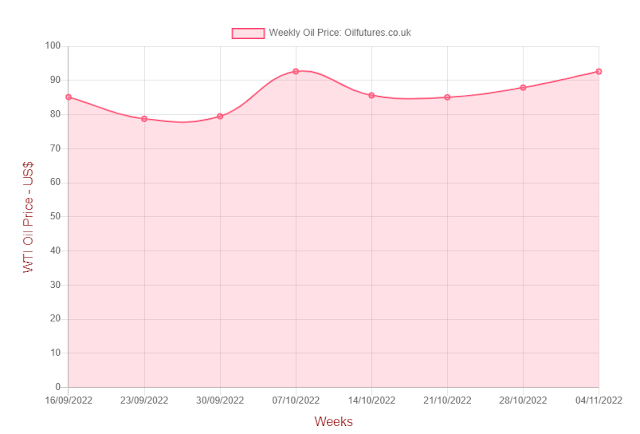The price of crude oil, which almost mimicked a turbulent whirlpool in a swollen river for the past few weeks, finally seemed to have found a certain sense of direction.
For three successive weeks, it has been rising despite the endless gloomy, economic news that has cast an ominous shadow across the globe: the unprecedented interest rate hikes, rampant inflation, stagnation of the tech sector and the relative apathy of consumers for spending, to name but a few.
Against this backdrop, the frequent, random lockdowns by China, the world's largest importer of crude oil, hardly helped resurrecting the sentiment in the oil sector.
There are, however, encouraging signs that China is finally relaxing their rigid Zero-Covid approach in order to minimize the inevitable, collective economic cost associated with it; the reported relaxation of the curbed imposed on air travel over Covid-19 is a case in point.
In another development, Saudi Arabia, meanwhile, reduced the price of crude oil for Asia this week. The announcement came hot on the heels of an interview given by the Iranian ambassador to India on Friday, in which the latter said that Iran was willing to sell oil to India, the world's third largest importer of oil, if the latter could get round the US sanctions imposed on the former.
Since India managed to import oil from Russia despite the displeasure of the US over the issue, analysts believe India may turn to Iran too, in order to look after its own economic interests first - perhaps at the expense of its exiting, strong ties with Iran's foe in the region, Saudi Arabia.
The development generated a greater buzz in political circles, because of a report in the Wall Street Journal about an 'imminent' attack by Iran against Saudi Arabia, citing Saudi intelligent sources.
It did not materialize in 48 hours as predicted; nor did it alarm the US allies to issue a rallying cry to assemble what President George Bush Jr used to call, a 'Coalition of the willing' in similar circumstances.
It is highly unlikely that Iran, which is in the middle of an unprecedented movement of protests by women over their rights, is in a position get involved in a war with Saudi Arabia - or any other country for that matter - which manages the two holiest sites in Islam at Makkah and Medina.
After a few days of silence, Iran scoffed at the report, while the Saudis kept mum about it.
The vulnerability of Saudi Arabia, however, when it comes to defending its oil facilities has been a hot topic in Washington, because the Biden administration and the Saudi royal family, especially the Crown Prince, have a frosty relationship that could determine the defense corporation between the two allies.
The recent production cut by the OPEC+ dealt a serious blow to the relationship that had already been under strain for months. The US vowed a strong response in return, without specifying what that could be, leaving it to wild interpretations, one of which, of course, is the potential removal of anti-missile systems from the Kingdom.
With the US midterm elections just 3 days away, the rising fuel costs and the inevitable inflation that stems from it can still affect the outcome.
In this context, if the Democrats suffer at the ballot box, the loyalists of the party will not find it difficult to identify the scapegoats.
All in all, the stakes cannot be higher for Saudi Arabia if the price of oil keeps rising on the grounds of supply woes, partly fueled by the production cuts.







